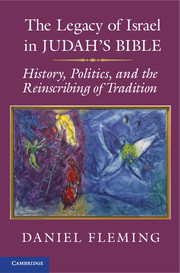Book contents
- Frontmatter
- Contents
- Preface
- Acknowledgments
- List of Abbreviations
- Part I Introduction
- 1 Why Israel?
- 2 Israel without Judah
- Part II Israelite Content in the Bible
- Part III Collaborative Politics
- Part IV Israel in History
- Bibliography
- Index of Biblical Texts
- Index of Near Eastern Texts
- Subject Index
- References
1 - Why Israel?
Published online by Cambridge University Press: 05 August 2012
- Frontmatter
- Contents
- Preface
- Acknowledgments
- List of Abbreviations
- Part I Introduction
- 1 Why Israel?
- 2 Israel without Judah
- Part II Israelite Content in the Bible
- Part III Collaborative Politics
- Part IV Israel in History
- Bibliography
- Index of Biblical Texts
- Index of Near Eastern Texts
- Subject Index
- References
Summary
The Bible would make a fascinating historical source, if only we could figure out how to use it as such. It is unique as a written corpus from the ancient world, not because it is religiously sacred, though perhaps its uniqueness is a result of the process that made it so. The Bible regales us with tales from the world of Egypt, Assyria, and Babylonia, offered from the perspective of the runaways and the defeated. It reports the reigns of kings not in the voice of royal propaganda but with distance and capacity for critique. It presents what are cast as the ruminations of men who spoke for God against both the people and the powers that led them. All this writing may date to settings long after the occasions portrayed, yet the literature is patently a patchwork of reused materials, not always well understood, certainly not a straightforward work of unified fiction.
Often, current discussion of the Bible's relationship to history revolves around the notion of “historicity.” Did it happen, or happen the way the story says? Did the individual characters exist? More broadly, does the story preserve some memory or knowledge of the time portrayed? If the answer is “no” or there is significant doubt about the matter, it can be difficult to make a case for historical investigation before the date of the latest editor's hand, and this will in no way illuminate the object portrayed. Since the nineteenth century, the task of tracing the process of a text's formation carried with it the hope of access to earlier historical settings, especially at the oldest core. Julius Wellhausen's famous analysis of sources in the Pentateuch (1885) was defined as Prolegomena to the History of Israel. The question is what historical knowledge can be sifted from narrative that has been constructed through layers of revision and combination. Literary-historical analysis such as that of Wellhausen will continue unabated, in spite of its frustrations. As historical settings are proposed and explored for earlier phases of biblical writing, the primary division may be between content from the people of Israel and content from the people of Judah. In the obscure process of its creation, the Bible joined the stories and the experiences of these two peoples into one, explaining Judah as part of Israel and Israel as belonging to the proper authority of Judah's royal house of David.
- Type
- Chapter
- Information
- The Legacy of Israel in Judah's BibleHistory, Politics, and the Reinscribing of Tradition, pp. 3 - 16Publisher: Cambridge University PressPrint publication year: 2012



